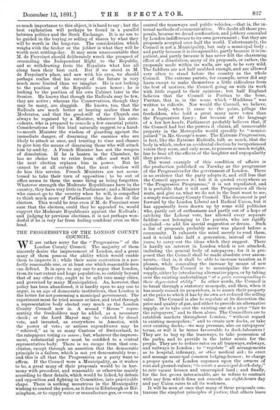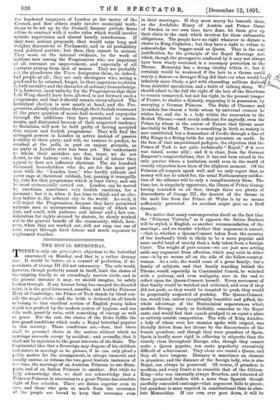THE PROGRESSIVES OF THE LONDON COUNTY COUNCIL.
E are rather sorry for the " Progressives " of the London County Council. The majority of them sincerely desire the improvement of London, and a great many of them possess the ability which would enable them to improve it ; while their main contention is a per- fectly reasonable one, or at least one which reasonable men can defend. It is open to any one to argue that London, from its vast extent and huge population, so entirely beyond that of any other city, ought to be split into many cities, and governed by many Municipalities. As, however, that policy has been abandoned, it is hardly open to any one to argue, in an age of democratic institutions, that London is the better for not possessing a municipal government. The experiment must be tried sooner or later, and tried through a representative body elected very much as the London County Council now is. A second " House " repre- senting the freeholders may be added, as a necessary check ; or the Lord Mayor may be elected by direct vote, and invested, as everywhere in America, with the power of veto ; or serious expenditures may be "referred," as in so many Cantons of Switzerland, to the ratepayers voting en, masse; but, whatever the improve- ment, substantial power must be confided to a central representative body. There is no escape from that con- clusion, except through an assertion that the democratic principle is a failure, which is not yet demonstrably true ; and this is all that the Progressives as a party want to affirm. If the Council were a Municipality, as it wishes to be, a great many of their proposals would be in har- mony with precedent, and reasonable or otherwise mainly according to their details, which would be licked, by debate and opposition and fighting in Committee, into practicable shape. There is nothing monstrous in the Municipality wishing to control the police, as it does in Edinburgh or Bir- mingham, or to supply water or manufacture gas, or even to control the tramways and public vehicles,—that is, the in- ternal methods of communication. We doubt all those pro- posals, because we dread confiscation, and jobbery concealed by London indifference to its own government ; but they are proposals accepted over half the world. Unfortunately, the Council is not a Municipality, but only a municipal body ; and partly because it is irresponsible, partly because it is im- patient, and partly because it has never felt the chastening effect of a dissolution, many of its proposals, or rather, the proposals made within its walls, are apt to be very wild. The faddists are not half snubbed enough, and are allowed very often to stand before the country as the whole Council. The extreme purists, for example, never did any harm except to make themselves a little ridiculous from the best of motives, the Council going on with its work with little regard to their opinions ; but half England believes that the Council is Puritan to the bone, Puritan, that is, in the sense which " Hudibras " was written to ridicule. Nor would the Council, we believe, as a body, when it came to the point, pillage the freeholders, who hold a great many more votes than the Progressives fancy ; but because of the language of a few hot-heads, Parliament probably believes that, if the Council had but the powers it claims, all immoveable property in the Metropolis would speedily be "munici- palised "in Mr. George's sense. The Extreme Progressives, in fact, like the Extreme Radicals, talk so much, that the body in which, under an accidental election by inexperienced voters they seem, and only seem, to possess so much weight, has to bear all the effects of the laughter and unpopularity they provoke. The worst example of this condition of affairs is the production published on Tuesday as the programme of the Progressives for the government of Loudon. There is no evidence that the party adopts it, and still less that the Council approves it ; but it is quoted everywhere as "the Progressive Programme," it is not repudiated, and it is probable that it will cost the Progressives all their seats, and give us, what we do not in the least want to see, a simply reactionary County Council. The document is put forward by the London Liberal and Radical Union, but it has apparently been drawn up by some wild politician who, partly out of enthusiasm and partly out of a hope of catching the Labour vote, has allowed every separate faddist—not belonging to the purists, who are rigidly excluded—to add his special suggestion or dream. Such a list of proposals probably never was placed before a community. It exhausts the mind merely to read them, and it would take half a generation, instead of three years, to carry out the ideas which they suggest. There is hardly an interest in London which is not attacked, including the general body of ratepayers ; for it is pro- posed that the Council shall be made absolute over assess- ments,—that is, it shall be able to increase taxation as it pleases, while concealing the increase by means of new valuations. The Council is to municipalise the water- supply, either by introducing alternative pipes, or by taking over the existing undertakings " at a price corresponding to their depreciated utility." In other words, the Council is to break through a statutory monopoly, and then, when it has nearly ruined its proprietors, is to annex their property at the price to which it has by its own act reduced the selling value. The Council is also to regulate at its discretion the price and quality of gas, and either to provide an alternative supply, or to take over the existing one at a price "fair to the ratepayers," and to them alone. The Councillors are to establish markets throughout London, "without regard to existing monopolies ; " and to create new docks, or take over existing docks,—we may presume, also on ratepayers' terms, or will it be terms favourable to dock-labourers ?
They are to buy up the tramways, to take possession of the parks, and to provide in the latter music for the people. They are to reduce rates on all tramways, subways, and railways in London ; to " regulate " all arrangements as to hospital, infirmary, or other medical aid ; to erect and manage municipal common lodging-houses ; to charge a proper quota of London expenses upon the owners of rent and ground-values; "to create a municipal death-duty;" to rate vacant houses and unoccupied land ; and finally, for the list grows interminable, are to refuse to contract with any firm which does not concede an eight-hours day and pay Union rates to all its workmen.
It will be seen at once that many of these proposals con- travene the simplest principles of justice, that others leave the burdened taxpayers of London at the mercy of the Council, and that others really involve municipal work- shops to be set up by the Council, because private firms refuse to contract with it under rules which would involve minute supervision and almost hourly interference. If they were serious proposals, they would raise long and weighty discussions in Parliament, and in all probability rend political parties ; but then, they cannot be serious. They must, on the internal evidence, be the work of extreme men among the Progressives who are impatient of all restraint on improvement, and especially of all restraint arising from lack of means. They are probably not the plunderers the Times designates them, or, indeed, bad people at all ; they are only ideologues who, seeing a good end to be attained, forget, in their eagerness to obtain it, both morality and the character of ordinary human beings. It is, however, most unlucky for the Progressives that their Left Wing should have been allowed to put forward such a programme, and that it should remain unrepudiated. The municipal election is now nearly at hand, and the Pro- gressives, already ridiculous through their foolish treatment of the grave question of music-hall morals, and unpopular through the additions they have promoted to assess- ments, and distrusted because of their suspected tendency to Socialism, will now be helel guilty of having accepted this unjust and foolish programme. They will find the strongest powers in London in active instead of passive hostility to their party, and will, we venture to predict, be crushed at the polls, in part on unjust grounds, as no party in London ever has been yet. The enthusiasts to whom their mistakes are due, trust, we do not doubt, to the Labour vote ; but the kind of labour they appeal to does not influence elections. The six hundred thousand householders who do, are for the most part men with the "London tone," who hardly ridicule and never rage at rhetorical rubbish, but, passing it tranquilly by, vote for that programme which is least viewy, and can be most economically carried out. London can be moved by emotions, sometimes very foolish emotions, for a moment; but it is, when it has time to think and an elec- tion before it, the soberest city in the world. As such, it will reject the Progressives, because they have permitted extreme men to misrepresent ideas many of which are just, and could, with patience and labour and a fair con- sideration for rights secured by statute, be slowly worked out to the general benefit of the community, which, how- ever, when they are worked out, will not reap one ear of corn except through hard labour and much exposure to unpleasant weather.











































 Previous page
Previous page